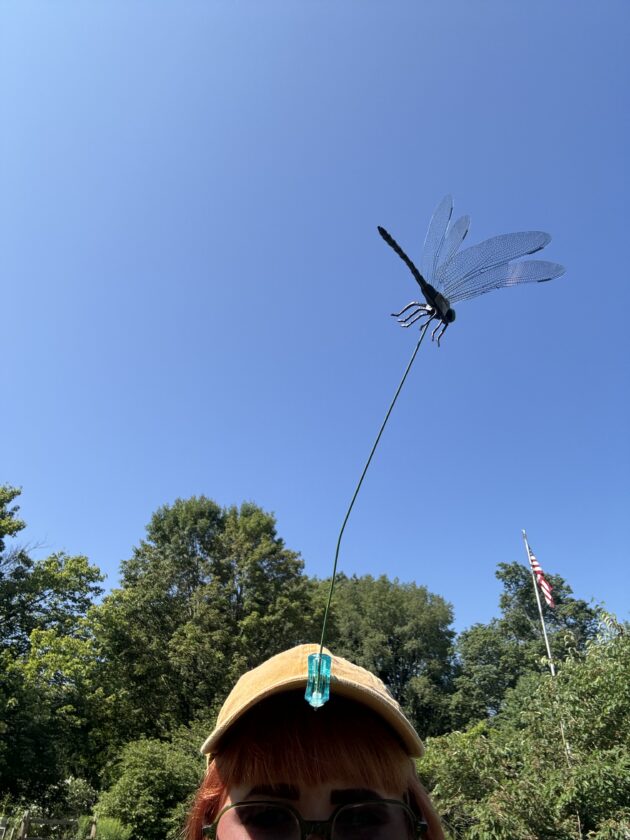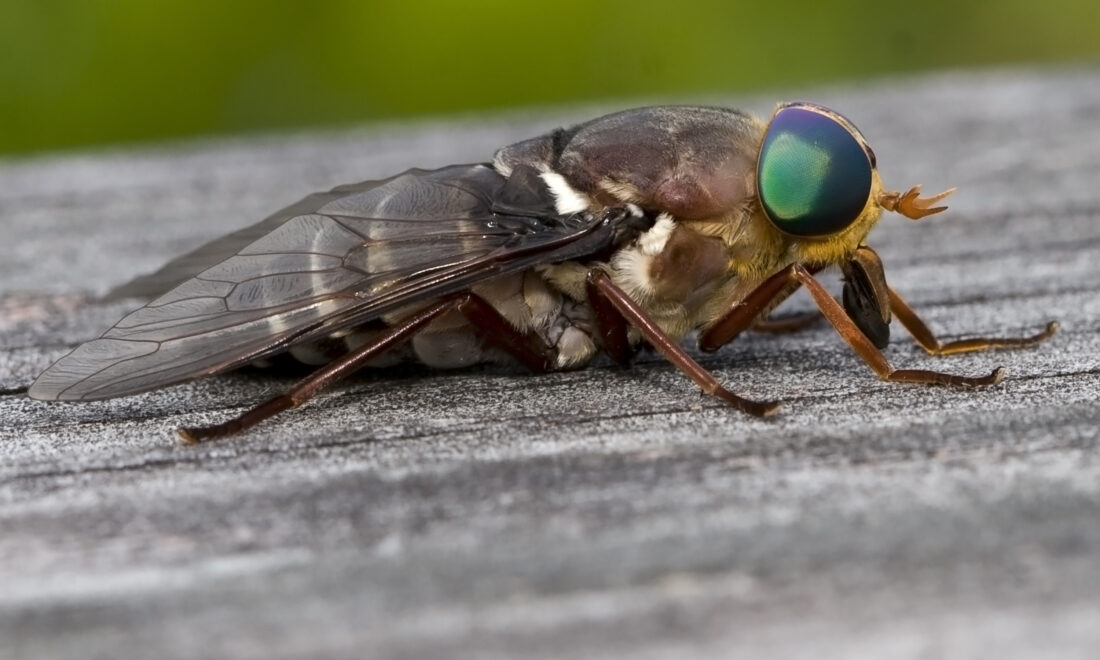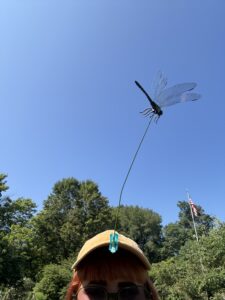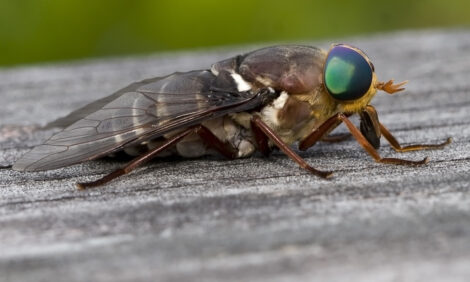Combat pesky insects naturally

Photo by Taylor Brennan An example of how a dragonfly wingman can be worn, effectively scaring away flies.
- Photo by Taylor Brennan An example of how a dragonfly wingman can be worn, effectively scaring away flies.
- Photo by Richard Crook A closeup of a horsefly, showing thousands of lenses used for visual hunting.
To combat the irksome qualities that come with spending time outdoors, we can use conventional inventions such as bug spray, electrified tennis rackets, or simply staying indoors to escape the bite of a blood-thirsty insect. However, nature provides us with natural insect repellents that are available for our use. We just have to know where to find it.
As I continue to gain knowledge about the natural world and all it has to offer, I have been focusing my summer research on natural remedies and ways to deter insects from using my skin as their feeding grounds. One method, that may also be a bit humorous, is called a “dragonfly wingman.” These clip-on realistic-looking dragonflies do wonders when the act of swatting away deer flies and horseflies no longer works. These types of flies hold a powerful bite, leaving one feeling irritated, swollen, and itchy for days afterward. Deer flies and horseflies are visual hunters, looking for moving objects to feast upon – meaning that when hunting for blood, we, along with horses, cows, and any other outdoor animal, become their prey. These biting flies also follow our breath, for they are keen on picking up on carbon dioxide and using that as a means to find blood.
By using this ‘predator versus prey’ mindset to our advantage, dragonflies spend their days hunting for deer flies and horseflies alike. Dragonflies have one of the highest hunting accuracy rates in the world – over 95% of the prey they feed on is captured successfully. When having a dragonfly wingman clipped onto your backpack, hat, or strap, flies see this dangerous winged shape and know to steer clear of this predatory area. This helps us humans stay bite-free and buzz-free as we wander through the forest on humid days. There are also recommendations of clipping a dragonfly wingman to a horse’s bridle, which can deter these pesky flies from swarming around their eyes in the summer. These clip-on dragonflies are widely available online, and can make a great and useful accessory to your next outdoor adventure.
Dragonflies aside, there are some well-known natural insect repellents that are safer for our skin rather than DEET or Picaridin, which are the active ingredients in many insect repelling sprays we purchase. DEET, known for its long-lasting effects, could cause skin irritation and should be applied to clothes in a well-ventilated space. Picaridin, on the other hand, may be the better alternative of the two – less odor, less skin irritation, but can leave a thick residue from its spray and can be bothersome to sensitive noses. Although

Photo by Richard Crook A closeup of a horsefly, showing thousands of lenses used for visual hunting.
these two ingredients are great at making us ‘invisible’ to mosquitos, they are not as effective towards deer flies and horseflies since their way of hunting is more visual-based than chemical-based. Mosquitos find their way to our skin by the scent from our blood, the carbon dioxide we exhale, and the heat we release during the summertime.
Some essential oils, which are derived from plants, can encourage mosquitos to find other hosts to feed upon. These include: tea tree oil, lemon balm, eucalyptus, and citronella. These scents can smell wonderfully refreshing to the human nose, but to mosquitos, it covers our natural scent they are searching for when looking for a bite to eat. These are best placed on forearms and a drop behind our ears, covering the warmest parts of our body. Some dilute essential oils with water in a spray bottle to evenly distribute its scent on the body. Although these scents do not make us ‘invisible’ like DEET and Picaridin do, they create a disturbance to mosquito scent receptors, effectively deterring them away from us. Tea tree oil can be considered dual purpose, since its scent is known to dispel ticks from wanting to bite us as well.
Another natural solution to stay bite-free this summer is to wear long sleeves and long pants while outside. This creates a physical barrier between your skin and a biting insect’s mouthparts. Covering our skin during the summertime has many benefits aside from blocking mosquito bites. It covers the largest organ on our body (our skin) from being burnt by the sun, can grant us a protective barrier if we come into contact with poison ivy, and can prevent ticks from biting otherwise exposed skin.
Whether you are outdoors every day or only a few times a week, we have all fallen victim to the summertime bug bites that plague our adventures. May you find one natural insect repellent that works for you!
Audubon Community Nature Center builds and nurtures connections between people and nature. ACNC is located just east of Route 62 between Warren and Jamestown. The trails are open from dawn to dusk and birds of prey can be viewed anytime the trails are open. The Nature Center is open from 10 a.m. until 4:30 p.m. daily except Sunday when it opens at 1 p.m. More information can be found online at auduboncnc.org or by calling (716) 569-2345.
Photos:
https://www.flickr.com/photos/jamestownaudubon/54713202837/sizes/o/ https://www.flickr.com/photos/stephenbegin/3541823943/sizes/o/ Photo by Stephen Begin







